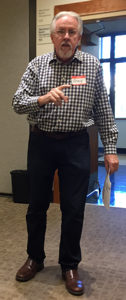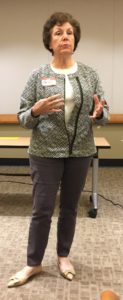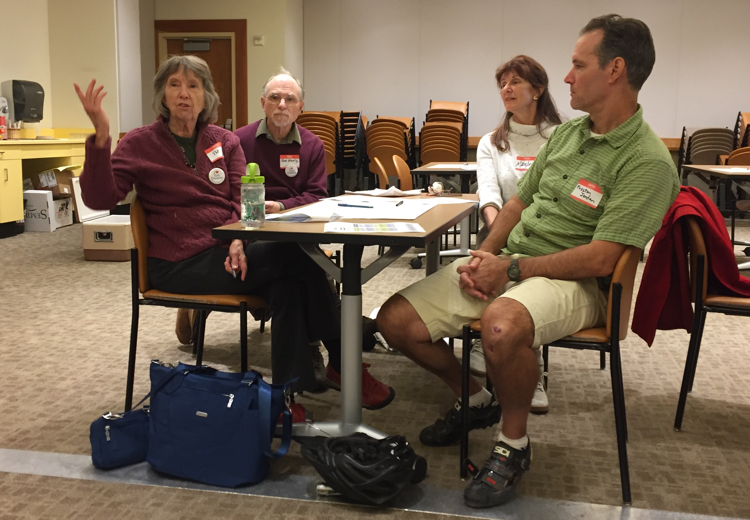How Should Communities Reduce Violence?
Event co-sponsored by League of Women Voters, Berkeley Albany Emeryville
“This Was So Enriching”
I heard my phone ding before we’d even finished loading up my car after December’s Safety & Justice Forum, a first for our community and our League of Women Voters, LWVBAE. “What now?” I thought.

Dr. Craig Patterson
CivilTalk Team of LWVBAE had their arms full of wall charts and food stuffs; we’d just cleaned up the Berkeley Library Community Room. Turns out, this ding was a text from the 22-year old black woman, a woman who was brave enough, earlier that day, to sit front and center in a room of people she had never met. All were determined to struggle through some very heavy topics surrounding prevention, de-escalation and consequences for Community Violence. Together.
“This was so enriching!” her text began.
I knew that this young woman was active in other unique meetings addressing inequality, safety and justice amongst her peer base. So how was this League CivilTalk discussion “so enriching” to her? CivilTalk studies all sorts of models of structured discourse, and everyone’s response to a model is important to our team.

Carole Patterson
Dr. Craig and Carole Patterson, National Issues Forum / Kettering Foundation deliberation experts, posed very hard questions from the start. After developing and agreeing to discussion norms, we were asked, in this group of mostly strangers, who might like to share one brief story of personal violence. Many spoke. We soon progressed to a unique deliberative dialogue about changes we’d like to propose in our community, to improve prevention, de-escalation, and handling of violence.
“Now Vote with your Feet!” smiled Carole Paterson.
…Easier said than done. Civil Talk Team’s LWV network partners from National Issues Forum, impartial experts in deliberative democracy, led the journey of our afternoon. After a short video to introduce the topic, Dr. Craig and Carole Paterson posed three questions; each time, participants lined up under markings on the wall, indicating how they felt about the question: Strongly Agree, Agree, Ambivalent, Disagree, or Strongly Disagree.
“What? It may be pretty tough for this group to find common ground,” I thought, as we spread ourselves all over the map. “How can we be so far apart about Safety & Justice issues?”
“Ah, but that was such a poignant exercise for me,” reported my Korean-born young friend. Looking around, I thought we’d all be agreeing on everything– but we were so divided by context and nuances and our own life experiences.”
It was true. We returned to tables to work diligently in small groups of four or five. Participants were asked to follow a carefully structured format to weigh the advantages and drawbacks of suggested solutions and common responses to the growing violence that we are all seeing and experiencing. Then, as in World Cafe discussion models, we recorded on butcher paper any common ground found at our tables and reported back to the whole group.
What changes would be most fair when taking into account potential gains and liabilities for freedoms and rights for self and others, police practices, policies and training, our incarceration policies — and most fair considering the biases posed by financial, physical, racial and mental inequalities?
“Be sure to share some personal ‘Aha! Moments’,” Craig, our communications expert guided, and as we shared, we saw people in other groups nodding. Some strange, fuzzy values or statements, through just being present with active listening, suddenly became clear.
“As a white male, I just never realized…” began a man in my group, shaking his head back and forth.
None of the answers in our deliberative discussion seemed truly ideal for all. Some solutions seemed surprisingly unworkable, when given deep reflection. Many hinged on Transparency. And Trust. And Investment. An investment, not only of Dollars but an investment in Focus, Time, and Training – Careful Training and Transparent Quality Control. So many things.
Grass-roots style, our belief in the others grew as the afternoon progressed. We began to hear “more of the pronouns ‘us and we’, than ‘me and them’,” as one person suggested at closing. Inclusivity not exclusivity. Also growing was a collective realization of the size of our task. Common goals, hard choices.
No, none of our answers seemed perfect. We need much more time and data to develop our ideas. At day’s end, most of us agreed this event was an enriching experience, and a good place to start.
To be included in future discussions, or in planning future discussions, please contact CivilTalk@LWVBAE.org.

Participants Pat Maelstrom, Joe Healy, Marybeth Falzareno, and Preston Jordan
Marybeth Falzareno
CivilTalk Team
League of Women Voters
All League News

